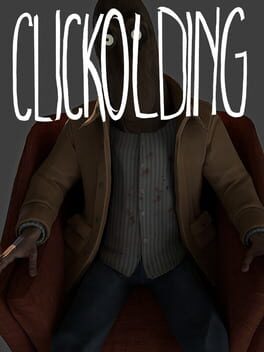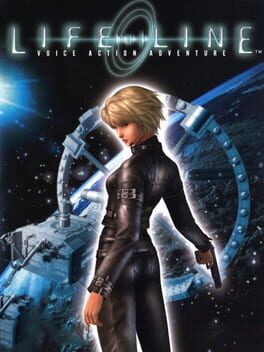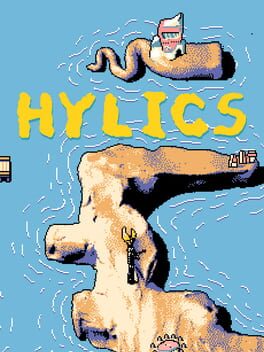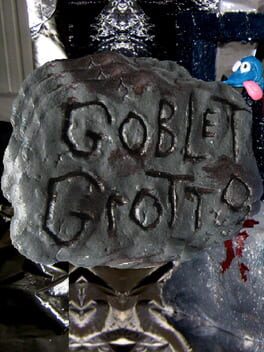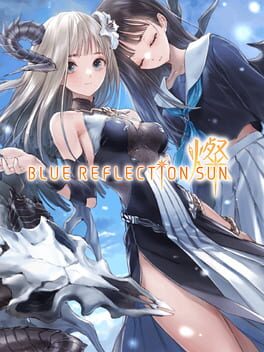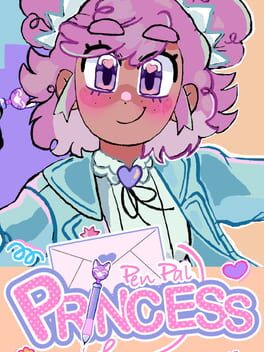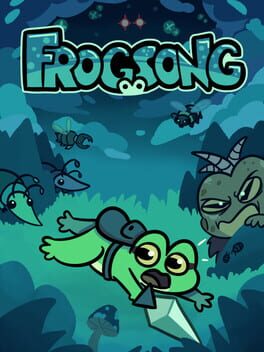rainfrog
77 reviews liked by rainfrog
Clickolding
2024
This review contains spoilers
I have yet to play through most of Strange Scaffold’s current catalog, but I enjoyed El Paso, Elsewhere well enough and I can appreciate Xalavier consistently pushing bite-sized, microbudget games between releases as little snacks or appetizers to whet the audience’s appetite for the bigger, meatier main courses.
That being said, if the title didn’t already give it away, Clickolding is a weird one.
This might be the longest “short” game I’ve ever played. All in all, my playtime was a little over an hour long – but for such a short game, it feels uniquely tedious and boring in a way that most games of a similar quality usually aren’t.
It’s nothing if not upfront. The Clickolder tells you as much within the first minute or so: the tally counter resets at 10,000. Didn’t seem so daunting until I’d reached the halfway mark, and even at that point the game feels like it’s lost most of its mojo.
Comes with a built-in auto-click function, so long as you keep the left mouse button held down. The game tosses in a few context-specific moments where progress halts until the player navigates to a specific part of the motel room, or interacts with a certain object. It never really leads to anything all that interesting (well, maybe not until the very end; or, more precisely, after the credits roll).
The dead air in the game’s latter half definitely feels intentional, but the effect never really landed for me. I feel this way about a lot of games. I’ll acknowledge if a game is being obtuse or difficult to get a rise out of me, sure, but I also feel like it’s a very delicate balancing act – at some point, the effect goes beyond challenging the audience and veers dangerously close to being Just Plain Bad, intentionally or otherwise.
Again, I’ll reiterate the fact that I played this game for a full 60 minutes and some change, and most of that time you’re not doing anything. You’ll be surprised to know I only looked at my phone twice. For 99% of my playtime I was glued to the screen, waiting for something new to happen. I was anticipating there being a larger point to it all, but again, by the time I’d reached that halfway mark I’d basically given up. Maybe it speaks to the type of gamer I am. I’d spend another 30 minutes to see the ending, even if I didn’t particularly care for the outcome. I watch the number go up. I get an ending. I spend another five minutes in the postgame, walk into a painting, meet a guy who tells me I can keep clicking, and decide I’ve seen enough. I don’t care to plumb the game’s remaining depths, assuming there are even any left.
Before I started playing this game, however, and as I was mentally preparing myself to write this ahead of time, I thought of the obvious comparison to be drawn between Clickolding and Clicker Games. I think about Cookie Clicker again, as I usually do, and I think about how I haven’t played it in over 3 months. I think about how I’ve unlocked 93% of the 637 achievements after 711.5 hours. I’m thinking – preemptively – about how many more hours I might spend chipping away at those last 41 achievements. How much do I have left in me? How much more time am I willing to lose to a game that is fundamentally a skinner box timesink?
There’s this line in Clickolding, the guy says, “You’ve got my hands. The hands I used to have.” Says that he’s sick, that it affected how he could click, “Can’t – click the way I want. Not like you.” Probably one of the only lines that made me stop and think about this character in context, made me consider the wider analogy: obviously, cuckolding, but like – why is this guy so into it? These lines actually made me consider the psychology behind his words and actions. For extraneous reasons, the man cannot click, and so he experiences this vicariously through the player.
This rationale made sense to me. For a second, I understood this character. It made me think about Cookie Clicker again. It made me think of how Cookie Clicker’s primary verb – that is, clicking – is outmoded so early on, reduced to an automatic function of subservient cursors and cookie-crafting constructs. I let the game play itself, watch the numbers balloon to cosmological proportions, buy more and more things to make the numbers get bigger, faster.
I’ll try not to ramble. We reach 10,000 clicks and he shoots himself in front of us. We watch the credits. Then, we reappear in the motel room, continuing where we left off. We can continue to press the clicker. The guy in the painting says he can watch us, or we can do it alone in the dark, empty motel room. As far as I’m aware, this is where the game ends. All that’s left is a white void and an ever-increasing number. No incentives. No changes. No way to save your progress.
In a lot of ways, it is a perfect antithesis to most Clicker-type games, a game that is almost fundamentally unsatisfying all the way to its conclusion and refuses to offer any incentive beyond the first and only objective.
In other words, Clickolding might be the best Cookie Clicker ever made.
That being said, if the title didn’t already give it away, Clickolding is a weird one.
This might be the longest “short” game I’ve ever played. All in all, my playtime was a little over an hour long – but for such a short game, it feels uniquely tedious and boring in a way that most games of a similar quality usually aren’t.
It’s nothing if not upfront. The Clickolder tells you as much within the first minute or so: the tally counter resets at 10,000. Didn’t seem so daunting until I’d reached the halfway mark, and even at that point the game feels like it’s lost most of its mojo.
Comes with a built-in auto-click function, so long as you keep the left mouse button held down. The game tosses in a few context-specific moments where progress halts until the player navigates to a specific part of the motel room, or interacts with a certain object. It never really leads to anything all that interesting (well, maybe not until the very end; or, more precisely, after the credits roll).
The dead air in the game’s latter half definitely feels intentional, but the effect never really landed for me. I feel this way about a lot of games. I’ll acknowledge if a game is being obtuse or difficult to get a rise out of me, sure, but I also feel like it’s a very delicate balancing act – at some point, the effect goes beyond challenging the audience and veers dangerously close to being Just Plain Bad, intentionally or otherwise.
Again, I’ll reiterate the fact that I played this game for a full 60 minutes and some change, and most of that time you’re not doing anything. You’ll be surprised to know I only looked at my phone twice. For 99% of my playtime I was glued to the screen, waiting for something new to happen. I was anticipating there being a larger point to it all, but again, by the time I’d reached that halfway mark I’d basically given up. Maybe it speaks to the type of gamer I am. I’d spend another 30 minutes to see the ending, even if I didn’t particularly care for the outcome. I watch the number go up. I get an ending. I spend another five minutes in the postgame, walk into a painting, meet a guy who tells me I can keep clicking, and decide I’ve seen enough. I don’t care to plumb the game’s remaining depths, assuming there are even any left.
Before I started playing this game, however, and as I was mentally preparing myself to write this ahead of time, I thought of the obvious comparison to be drawn between Clickolding and Clicker Games. I think about Cookie Clicker again, as I usually do, and I think about how I haven’t played it in over 3 months. I think about how I’ve unlocked 93% of the 637 achievements after 711.5 hours. I’m thinking – preemptively – about how many more hours I might spend chipping away at those last 41 achievements. How much do I have left in me? How much more time am I willing to lose to a game that is fundamentally a skinner box timesink?
There’s this line in Clickolding, the guy says, “You’ve got my hands. The hands I used to have.” Says that he’s sick, that it affected how he could click, “Can’t – click the way I want. Not like you.” Probably one of the only lines that made me stop and think about this character in context, made me consider the wider analogy: obviously, cuckolding, but like – why is this guy so into it? These lines actually made me consider the psychology behind his words and actions. For extraneous reasons, the man cannot click, and so he experiences this vicariously through the player.
This rationale made sense to me. For a second, I understood this character. It made me think about Cookie Clicker again. It made me think of how Cookie Clicker’s primary verb – that is, clicking – is outmoded so early on, reduced to an automatic function of subservient cursors and cookie-crafting constructs. I let the game play itself, watch the numbers balloon to cosmological proportions, buy more and more things to make the numbers get bigger, faster.
I’ll try not to ramble. We reach 10,000 clicks and he shoots himself in front of us. We watch the credits. Then, we reappear in the motel room, continuing where we left off. We can continue to press the clicker. The guy in the painting says he can watch us, or we can do it alone in the dark, empty motel room. As far as I’m aware, this is where the game ends. All that’s left is a white void and an ever-increasing number. No incentives. No changes. No way to save your progress.
In a lot of ways, it is a perfect antithesis to most Clicker-type games, a game that is almost fundamentally unsatisfying all the way to its conclusion and refuses to offer any incentive beyond the first and only objective.
In other words, Clickolding might be the best Cookie Clicker ever made.
Lifeline
2003
I enjoyed this game a lot more than I was expecting. Many will tell you that the voice commands are incredibly finicky and that's only somewhat true... It becomes irritating mostly when you're surrounded by a lot of quick enemies in a fight which fortunately doesn't happen terribly often. This game may give you a lot of problems if you have a particularly thick accent as well. The occasional awkwardness extends towards a handful of other aspects besides the voice recognition.
For starters, Rio doesn't have much in terms of AI... She will often just kind of stand or pace around doing nothing unless you give her very particular instructions, though this isn't that noticeable out of combat since you're just giving her directions from a map. In combat, though if she loses track of the enemy she will just stand there doing absolutely nothing until you instruct her to turn around or look elsewhere. You need to tell her to do pretty much everything else too actually including fleeing, how often she fires, dodging, etc. This felt especially awkward given her characterization.
Rio, as the star character, is pretty cool. She's assertive and level-headed, but still comes across like a normal person and not some kind of action hero (which makes her need for hyper specific directions feel kind of weird). I went into this expecting her to be a sort of... helpless and shy type character for the player to fawn over and was pleasantly surprised. The game cared a lot about making you and Rio feel like a team.
I was pleasantly surprised by the narrative too. It was.. kind of B-horror type stuff but I found myself pretty invested in it and it ultimately tries to make a bit of a statement but nothing too grandiose.
I guess overall I was expecting this game's appeal to lie completely in its novelty. The game is for sure a little more than that. I'll remember it fondly.
For starters, Rio doesn't have much in terms of AI... She will often just kind of stand or pace around doing nothing unless you give her very particular instructions, though this isn't that noticeable out of combat since you're just giving her directions from a map. In combat, though if she loses track of the enemy she will just stand there doing absolutely nothing until you instruct her to turn around or look elsewhere. You need to tell her to do pretty much everything else too actually including fleeing, how often she fires, dodging, etc. This felt especially awkward given her characterization.
Rio, as the star character, is pretty cool. She's assertive and level-headed, but still comes across like a normal person and not some kind of action hero (which makes her need for hyper specific directions feel kind of weird). I went into this expecting her to be a sort of... helpless and shy type character for the player to fawn over and was pleasantly surprised. The game cared a lot about making you and Rio feel like a team.
I was pleasantly surprised by the narrative too. It was.. kind of B-horror type stuff but I found myself pretty invested in it and it ultimately tries to make a bit of a statement but nothing too grandiose.
I guess overall I was expecting this game's appeal to lie completely in its novelty. The game is for sure a little more than that. I'll remember it fondly.
Lifeline
2003
sometimes frustrating as hell but honestly underrated! This was such a novel concept at the time and I love that it was paired with a B-movie sci fi genre setting--of COURSE it's set during Christmas Eve! The gameplay can be invigorating when the voice detection works for solid stretches of time, and it's goofy silly fun to laugh at when it doesn't. Aside from one punishing combat gauntlet section, I never really felt that angered by the clunky word detection of the AI because it rarely demands that much precision from you in order to scrape by. It all feels kind of like you're some idiot genre movie director haplessly instructing a scatterbrained first time actress in a messy low-budget horror movie-and I mean that as positively as possible!!!!! Absolutely love the ridiculous Dora the Explorer sequences where Rio looks at the player pleadingly with dumb eager bambi eyes and asks you for 8 words associated with "hospital room" or what color candy she should eat
Lifeline
2003
sadly i lost my save file after i got softlocked anyways, & i don't know if i want to replay up to where i got stuck.
i did love this game, using your voice to talk to the main character gives a connection to her that is special. the way rio holds eye contact & has deep conversations with the player is something i haven't really seen in games like this before. it gives you this weird third person feeling that you don't get in games that often. despite you controlling the character, you aren't "playing" as her. she has feelings, gets frustrated, replies in sassy manners, & gets upset at you.
it's a really, really neat game besides being clunky & honestly very hard. the voice recognition software is obviously old & flawed, which caused me to use all my health drinks right before a big boss that i didn't know was coming. i guess i don't say some words correctly because it took me actually 45 minutes to look at a very important "desk," & some enemies i couldn't defeat the correct way because it didn't understand body parts i was trying to say.
everything aside, this is a really neat game, albeit infuriating in some parts. but i absolutely love how you're your own character, even though you're not "in" the story at all (sort of. you are, but in a disconnected way.) having an "emotional connection" to the person you're controlling in the game is a very interesting concept.
i did love this game, using your voice to talk to the main character gives a connection to her that is special. the way rio holds eye contact & has deep conversations with the player is something i haven't really seen in games like this before. it gives you this weird third person feeling that you don't get in games that often. despite you controlling the character, you aren't "playing" as her. she has feelings, gets frustrated, replies in sassy manners, & gets upset at you.
it's a really, really neat game besides being clunky & honestly very hard. the voice recognition software is obviously old & flawed, which caused me to use all my health drinks right before a big boss that i didn't know was coming. i guess i don't say some words correctly because it took me actually 45 minutes to look at a very important "desk," & some enemies i couldn't defeat the correct way because it didn't understand body parts i was trying to say.
everything aside, this is a really neat game, albeit infuriating in some parts. but i absolutely love how you're your own character, even though you're not "in" the story at all (sort of. you are, but in a disconnected way.) having an "emotional connection" to the person you're controlling in the game is a very interesting concept.
Hylics
2015
It's hard for me to talk about this one because on the one hand I honestly don't personally vibe with this style of RPG (but that's not the game's fault and I feel like it does it fairly well) and also it made me feel weird and anxious and uncomfortable (which speaks to the quality of the game and its art direction but does mean that I did not Like It in the traditional sense). BUT. ALSO. It looks so fucking cool, the claymation thing kicks ass, it's like 3 hours long which is great, Somsnosa please call me. I love the existence of any art that can make me feel weird and nauseous and annoyed even if I don't Like It. Can't wait to play the second one and want to die the whole time.
Baldur's Gate 3
2023
Baldur's Gate 3
2023
My friends who’ve heard me talk about this game are going to think this score is nuts. I’ve told everyone how much I love this game. I’ve gushed about this game. I’ve made gifsets and fanart. I’m going to replay it 500 times and make a gazillion player characters. I really, truly love it, and there’s so MUCH to love. The scope, the ambition, the responsiveness of the world and the characters. I love the world and the stories, the way nearly every quest has a million ways you can sneak through or around it. I love the breadth of characters and all of their arcs. I love the recurring theme of how revenge rarely feels as liberatory as you want it to and yet sometimes it still has to be done. I love the themes of autonomy and losing it and taking it back. I love how the characters can grow and change even when you don’t outright convince them. I love how the game looks and the art direction and the lighting. It also drives me fucking nuts. And it’s not even (entirely) the game’s fault.
To be clear, there are, genuinely, things wrong with the game in and of itself. It’s buggy in places — Act 3 especially — and every fix or patch adds three new bugs for every one it removes. Wyll’s arc is short-changed in a way that’s hard not to see as antiblackness. The turn-based combat means that every encounter with more than five or so enemies ends up being slow as sin, and there’s no meaningful attempt by the game to circumvent this issue. Moving through the world out of combat never feels bad, but it never feels awesome, either. Some of the side characters who are from older games are characterized completely differently and often contradictoraly from their old appearances, which is bound to piss off old fans. But, honestly, all of these issues on their own would still have me slapping a 4.5 or even a 5 on this game and moving along, because it really is still GREAT.
No, the real issue is the fandom. They’re insufferable. When they’re not making petitions to add new romances (always with men, incidentally!) or having meltdowns because a writer dared to say that continuing the cycle of abuse was a bad end, they’re trying to dox the devs so they can get new Rolan (another man!) content added. “Rain,” I hear you say, “That’s not fair. You can’t punish the game for the fandom.” That’s true! I’m not out here badly rating Sonic or Dragon Age games just because those fandoms need to be nuked from orbit. The problem here is that Larian fucking worships the fandom. They’re making changes to arcs and endings and characters on patch 900-whatever to appease the fandom! Lae’zel is too mean? Oh, okay, we’ll make her nicer! This ending is too sad? Oh, okay, we’ll soften it! You think Gortash is really sexy? We’ll borrow fan conent to add new stuff for him! (Were those fans PAID? CREDITED?) To be clear, on an objective level I LIKE some of the changes they’ve made. But I don’t WANT to play “Larian’s game but filtered through the lens of what I personally like,” I want to play “Larian’s game and Larian’s story.”
The lack of willingness in the gaming world right now to create games that don’t cater to the player, where the devs and the writers tell the story they aim to tell and build the mechanics they want to use and STICK TO THAT VISION, even if it adds friction or some gamers won’t like it or some fans complain drives me insane. I don’t want something that appeals to everyone, I want something specific and real. The idea that some fucker got mad because Larian dared to make a character that didn’t worship the player immediately and Larian bowed down and caved to the shit makes me want to blow up. STICK TO YOUR VISION AND YOUR STORY, PUSSIES! I’m about to get mad about the ME3 ending shit again good god.
It’s just such a frustrating encapsulation of everything wrong with gaming right now and how fandoms have too much power and too little imagination, and it breaks my heart how much it’s soured my stomach on a game I do genuinely adore. It’s so good where it’s good! It’s goddamn perfect! The love from the team is dripping out of every pore. But it’s impossible to look past the fact that the game that exists now is a different game than the one that was initially released, with different characters, because some people on the team felt that compromising their artistic vision was worth it if it’d make some fandom rando happier.
I still adore this game and, seriously, if you love RPGs or the like this really should be a must-play. It’s a joy. Its scope and ambition are second to none, and I have to cheer that on (particularly given how every other big studio is playing shit so safe right now) even when it doesn’t stick the landing. I love my gang of bisexual war criminals. Despite the tone of this review, I even love Larian; the next Big Game I plan on starting is Divinity: Original Sin 2 entirely because I love this game and Larian’s work on it so much. It’s such a wonderful piece of art. I hope the next one they make will be one with choices they have the guts to stick to.
To be clear, there are, genuinely, things wrong with the game in and of itself. It’s buggy in places — Act 3 especially — and every fix or patch adds three new bugs for every one it removes. Wyll’s arc is short-changed in a way that’s hard not to see as antiblackness. The turn-based combat means that every encounter with more than five or so enemies ends up being slow as sin, and there’s no meaningful attempt by the game to circumvent this issue. Moving through the world out of combat never feels bad, but it never feels awesome, either. Some of the side characters who are from older games are characterized completely differently and often contradictoraly from their old appearances, which is bound to piss off old fans. But, honestly, all of these issues on their own would still have me slapping a 4.5 or even a 5 on this game and moving along, because it really is still GREAT.
No, the real issue is the fandom. They’re insufferable. When they’re not making petitions to add new romances (always with men, incidentally!) or having meltdowns because a writer dared to say that continuing the cycle of abuse was a bad end, they’re trying to dox the devs so they can get new Rolan (another man!) content added. “Rain,” I hear you say, “That’s not fair. You can’t punish the game for the fandom.” That’s true! I’m not out here badly rating Sonic or Dragon Age games just because those fandoms need to be nuked from orbit. The problem here is that Larian fucking worships the fandom. They’re making changes to arcs and endings and characters on patch 900-whatever to appease the fandom! Lae’zel is too mean? Oh, okay, we’ll make her nicer! This ending is too sad? Oh, okay, we’ll soften it! You think Gortash is really sexy? We’ll borrow fan conent to add new stuff for him! (Were those fans PAID? CREDITED?) To be clear, on an objective level I LIKE some of the changes they’ve made. But I don’t WANT to play “Larian’s game but filtered through the lens of what I personally like,” I want to play “Larian’s game and Larian’s story.”
The lack of willingness in the gaming world right now to create games that don’t cater to the player, where the devs and the writers tell the story they aim to tell and build the mechanics they want to use and STICK TO THAT VISION, even if it adds friction or some gamers won’t like it or some fans complain drives me insane. I don’t want something that appeals to everyone, I want something specific and real. The idea that some fucker got mad because Larian dared to make a character that didn’t worship the player immediately and Larian bowed down and caved to the shit makes me want to blow up. STICK TO YOUR VISION AND YOUR STORY, PUSSIES! I’m about to get mad about the ME3 ending shit again good god.
It’s just such a frustrating encapsulation of everything wrong with gaming right now and how fandoms have too much power and too little imagination, and it breaks my heart how much it’s soured my stomach on a game I do genuinely adore. It’s so good where it’s good! It’s goddamn perfect! The love from the team is dripping out of every pore. But it’s impossible to look past the fact that the game that exists now is a different game than the one that was initially released, with different characters, because some people on the team felt that compromising their artistic vision was worth it if it’d make some fandom rando happier.
I still adore this game and, seriously, if you love RPGs or the like this really should be a must-play. It’s a joy. Its scope and ambition are second to none, and I have to cheer that on (particularly given how every other big studio is playing shit so safe right now) even when it doesn’t stick the landing. I love my gang of bisexual war criminals. Despite the tone of this review, I even love Larian; the next Big Game I plan on starting is Divinity: Original Sin 2 entirely because I love this game and Larian’s work on it so much. It’s such a wonderful piece of art. I hope the next one they make will be one with choices they have the guts to stick to.
